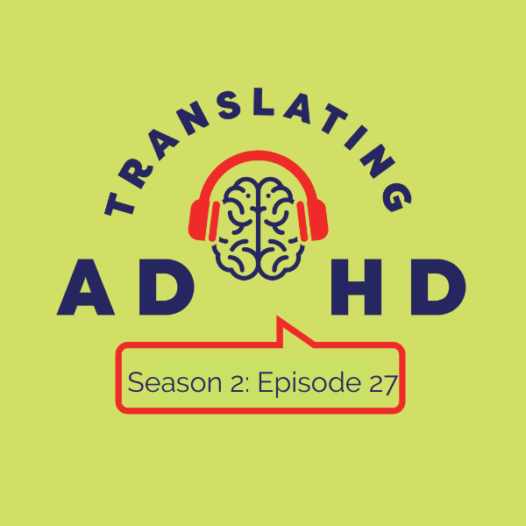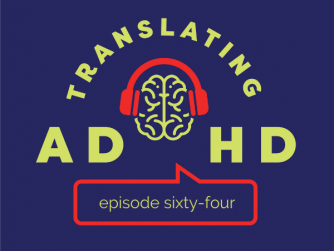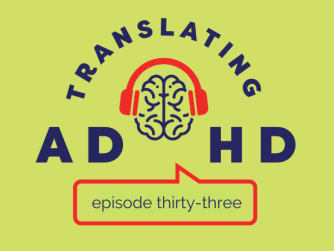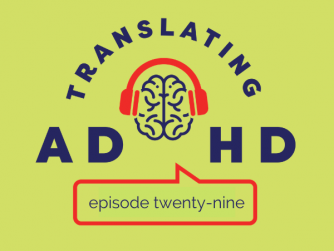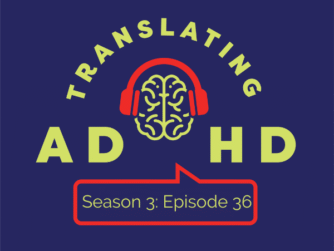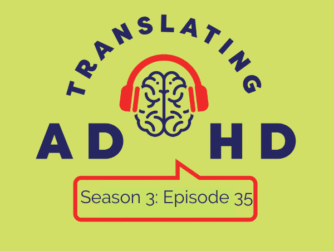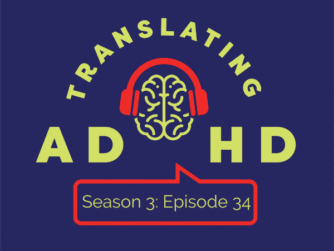In this episode of Translating ADHD, Ash and Cam continue on the topic of collapsing frameworks and how this can lead to self-doubt and imposter syndrome. Cam shares a client example of a college president who struggles with doubt immediately after very public events. Cam introduces the unique ADHD phenomenon of hyper-focusing on small data points and extrapolating negative conclusions from them and how this contributed to his client’s sense of doubt. Those of us with ADHD are prone to a “Dip of Uncertainty” especially after an intense performance. Cam and Asher discuss strategies for managing this doubt and related emotions.
Asher introduces other factors such as the influence of hormonal fluctuations and how this can contribute to sewing seeds of doubt. The hosts discuss the idea of diversifying sources of feedback. The episode emphasizes the importance of separating emotions from underlying narratives and collecting diverse data to combat self-doubt and maintain resilience.
Episode links + resources:
For more of the Translating ADHD podcast:
- Episode Transcripts: visit TranslatingADHD.com and click on the episode
- Follow us on Twitter: @TranslatingADHD
- Visit the Website: TranslatingADHD.com
Episode Transcript:
[00:00:00] Ash: Hi, I’m Ash, [00:00:01] Cam: And I’m Cam. [00:00:02] Ash: And this is Translating ADHD. Cam, what are we going to be talking about today? [00:00:08] Cam: So Ash, last week we were talking about when routines collapse, and we talked about several different client scenarios where that happens in the sense that it’s difficult to remember the benefit of the routine. And then we make this amazing case for not getting back to the routine, or this was the what, what one of our clients in our Discord coaching in the round sessions. What happened there?And so this week we’re going on the same theme a bit around how things will falter, collapse, this calamity it’s like a shark week on Discovery Channel. It’s like, let’s look at collapse and how that can happen. This week I was thinking about several clients who are doing some great work, but this really interesting phenomenon where they will extrapolate a single data point, a single or a few data points to hyper focus on a data point and extrapolate that out into some conclusion, some evaluation, some judgment, and it’s not necessarily positive.
Now, just looking back. I’ve been seeing this in, again, clients who are doing great work doing amazing stuff and these sort of moments, these vulnerable moments. They will start to focus on data that is there and not there. And so, today I thought we would look at that of like how we can kind of have things fall apart and, and we can be vulnerable to imposter syndrome when we are only going on limited data. How’s that sound?
[00:01:58] Ash: Sounds good, Cam. Where are we going to start? [00:02:00] Cam: I’ll start with how the ADHD might be coming into play. And there’s a lot of focus on rejection, sensitivity, imposter syndrome, and, and this experience, these experiences that we have now, not now concept of time or, or the experience of time and how ADHD will contribute to that experience.And so, how is it that. People who are successful, they’ve had lots of success, big impact in their lives. Most of these individuals are business owners or leaders in a field they’re respected. And they’re competent. And from the outside, it looks like they wouldn’t have a worry in the world.
And yet with ADHD on board, there can be these moments where they lose sight of their mission, their purpose, their identity, their strengths. So we’ve talked in the past about this sort of rope bridge metaphor or analogy of tethering to outcomes and resources, our big agenda, and building our rope bridge over the obstacles and challenges.
And that, that whole scenario can kind of fade in this moment. And the one that I’m seeing, or just noticing, in my client work is how, again, this almost like a hyperfocus – hyperfocus or rumination – on selected and, and a small data sample. So what we tend to do, I think, is that we will oversample. So, hyperfocus.
We talk always about hyperfocus and how we hyperfocus on things getting things done and how hyperfocus can be a positive thing. Or if we go down a rabbit hole and we, you know, I didn’t plan to do that. It can be a not so positive thing. But the other thing with hyperfocus is, man, we will hyper attend to some information.
We go in, we get that information. That inner critic, our saboteurs, our judge, will put their take on it. We’ll then have this making of meaning event, and we’ll take this very small data sample, and we will carry it out to this nth degree of what it means.
So a couple of examples are and a lot of, a lot of times, Asher, it’s around, it’s judgment around performance and this sort of sense of I’m only as good as my, the last thing I did. So I’ll talk about one in particular where a someone, a university president, is working up to this big gala event. He has words to say, everyone’s like, that’s amazing. You know, you should be so proud of what you’ve done, but this large gala event and this large capital campaign, he’s articulate, he gets the job done.
He sits down and then it’s this doubt, this moment of doubt starts to creep in. And this is after the event, after the workup to that. It’s like here’s this sort of moment of vulnerability where what is that sample that he’s sampling in order to create that seed of doubt? So there’s a seed of doubt and then it blossoms quickly into yeah, you, are you up to this? Why do they think you’re so awesome?
And this is a really interesting thing, is that on the outside there are people who are making things happen, making big contributions, having a big impact, leading effectively. And on the inside is this torment and turmoil and doubt. And so you can go the sort of the psychological route, or again, you know, historical, yes, it could have been a past experience around everyone questioning the performance piece.
Of everyone who’s listening knows this experience of, of being in school and it’s like, okay, that was great. You did that, but can you do it again? Or why can’t you do it again? Or back to your universal question, Asher, of why is it that I don’t do what I know I ought to do?
But the phenomenon here to where our listeners can kind of start to tweak is what are you doing? How are you sampling data? Right? So again, we will over sample, hyper fixate on a small data set to convince us of what we already are thinking, so we’re kind of like, this is the confirmation bias that occurs. But it’s that frequency and intensity that is unique to ADHD, where we will sample hard and, and like, again, how’s this sampling give me the thing that I think is true.
[00:07:26] Ash: Yeah, and the phenomenon is kind of twofold, right? Especially when it intersects with something ADHD that we’ve been criticized for our whole lives or something we’ve struggled with in the past. I’m thinking of a client who had a workplace struggle with another coworker.She works in special education. She’s an occupational therapist. This other person is in a related profession. So they work with the same kids on different things, and their interactions were always explosive. This person is hypercritical of my client in private and in public in meetings with their whole department.
And so this put my client in a terrible one down place. Number one and number two, it brought forward some old stories. My client has been at this school for a long time and has a great track record there. But earlier in her career, she cut and run a couple of jobs. Things weren’t going well, and she just quit and clean slated and got a different job.
And so those performance issues and the challenges that she had in the past, she’s questioning, is that how I’m showing up here? Is how this person talks to me and criticizes me how everyone else sees me? Despite no evidence to that point, it actually took this client quite a while to get to the point where she was even comfortable going to her boss, who she has a great relationship with to talk about this, because there was this visceral fear. Maybe this is how everyone else sees me.
So we have the, the criticism or the, the thing that said to us, or the thing that gets in our head. And then we can drag forward all this old context that has nothing to do with this current situation. And then so often I see with my clients, they feel like they’re backed into a corner because the way out of this is to get some other data, right?
How do I reconnect to what I know or how do I check in on this is to find out, is this true? Is this not true? Where am I really at? And my client was terrified to do that. Because in her mind, there was a very real possibility everyone else felt that way, too. And this person was the only person that was willing to say that. Now what the reality actually ended up being is that this person is a challenging personality to work with and other people have similar challenges with her as well. Why she’s singled out my client to confront so explosively, who knows, but this is not my client’s stuff. This is the other person’s stuff.
And man, that can be hard for us to face as people with ADHD and Ooh, does that cut and run instinct come in strong. In situations like that, I don’t know what your university president went through, but certainly, for my client, it’s like, maybe it’s time to move on or make a change because maybe this is how I’m perceived here.
[00:10:59] Cam: For me, that was my, I was like, I was, I was cut and run Cam. I mean, it was like, it’s getting too hot in here. It’s, and, and here’s the thing, it’s getting too hot, it’s getting complicated. And whether it’s conflict, perceived conflict, and we don’t see a way forward because it’s executive function rich.And so the option is, is like, I’m just, I’m just going to end it in the sense of, I’m just going to exit out of the situation. That was, that’s a great example. That was not necessarily the story. I mean, here’s this president in a very supportive environment and well revered and well supported all around. The thing that’s going on for him is, and I think this is, a lot of listeners will identify with this.
And it’s back to last week with the example we had around collapsing routines. Of this erosion of the sense of the benefit the connection to the benefit of the practice and that as we go through time are you talk about we will kind of re energize or reactivate old stories and bring them forward and kind of compare them to the data that we have or the data we are selecting. And the other thing that happens is we have a heck of a time remembering past successes where we were awesome, where we were resilient, where we were resourceful. That tends to fade, especially when we’re out of practice.
And so this is something that says we’re going along and oh, by the way, the other thing is, you know, all this energy is going into getting ready for this event, Asher. Right. The planning, the sort of thinking about the situation and then after the event, post event is a letdown, right, is an energy letdown.
And so that’s that dip, whereas again, my client is recognizing, Oh, you know, I’m, I’m, and he was sort of like almost like, confusing his fatigue and emotional kind of down for doubt. It’s like, I shouldn’t feel this way, you know, I shouldn’t feel this way. And then starting the questioning and doubting.
So this is something listeners to, to just be paying attention to , and if you’re particularly hard on yourselves, when are you hard on yourselves? This is the thing that I’m noticing with my clients is they tend to be hard on themselves. After an event, after a kind of a command performance type thing where they got to show up for something and it’s leaving, there’s this second guessing, there’s a second guessing, there’s a doubting, and it’s sort of, there’s a vulnerable spot where if we’re not tethered to our who, our why, why we’re here.
And in that vulnerable moment, it’s just that inner critic or judge will kind of find a way to sneak in and whisper in your ear and like bring up an old story,
[00:14:18] Ash: Cam, I’d be remiss to not mention this one. Because it’s something that I see in so many of my clients and something that we work on explicitly is my clients who menstruate. PMS is a ripe time for those negative voices to come knocking, to come knocking hard to the point that my clients who have been at it for a while and who are having a different experience, it’s almost jarring, unnerving.Where is this coming from, these old stories coming on so strong? Why am I suddenly back to doubting myself this strongly? And so you’re right when fatigue, exhaustion, hormonal challenges, anything else are in the room, we can mistake that for regression. Cause that old story pops up in full relief like it never went away. Like, Oh, I thought I’d made some movement on that, but boom, there it is right there. Just as it was before.
And it can catch us off guard. For me, naming that voice – I called it the P. I don’t menstruate anymore. Thankfully, one of the perks of HRT. But when I did naming that voice, the PMS gremlins and just being a little bit more attention, giving it a name separate from myself and knowing that it was something that was going to come.
Now, what that didn’t do is instantly make me feel better, right? PMS week was still a down week in terms of mood, energy, et cetera. But I was able to stop the rumination like, Ooh, where’d that ugly thought come from? Oh, let me look at a calendar must be the PMS gremlins. And I, Was able to detach from a little, a little bit.
So it’s not in this case necessarily about being able to just full on about phase pivot and, Oh, I’m great now. And the energy is back. It’s about being where you are, but having a different experience in that space where the stories don’t have to take over and send you into a spiral.
[00:16:37] Cam: right? And it’s this recognition of self care and needs, right? To identify this, this is where I need to really take care of myself. I appreciate that example of naming it, because that’s exactly what my client did with this. He named it this period of after. An event, an intense event, and even a small event, sort of this questioning, this second guessing, this doubting.He called it the dip of uncertainty. Here’s this dip of uncertainty where it’s like he walks out of that public situation and it’s all of a sudden it’s just like, boom, questioning. And, and no one else is questioning, it’s he’s questioning, like, how’d I do? Did I do? And this, this sort of, and it turns into a judgment evaluation.
And so to name it dip of uncertainty, number one. Number two, to turn down that sampling. That frequency intensity of sampling, you know, how’d I do, how’d I do, I’m, I, you know, that guy was looking funny at me, what’s going on with him, but that degree of sampling to turn it down a bit and the term he came up with was to sort of exit with grace.
And so here’s, this thing is, and to allow for exiting or transitioning out of that event and yeah, allow for the dip to anticipate the dip, to plan for the dip. , and my clients who are have menopause, paramenopausal, it’s that anticipating that week and how can I anticipate that and make plans for and that can help.
So what do you think about finishing up there, Ash?
[00:18:17] Ash: I have one more little thing to take us out actually. [00:18:19] Cam: Great. [00:18:19] Ash: Cam, I think sort of the moral of today’s episode is that ADHD and emotion are intrinsically linked, but just because the emotion is there, and we’ve said this on the show before, but not in this context, just because there is an emotional experience, it doesn’t necessarily mean that the stories or the context that we drag in that will follow that are real.And in this case, we’re talking a lot about how things in our body and our physiology or natural sort of cycles of leading up to, you know, the adrenaline and anticipation up to a peak. Yeah. There’s going to be a natural valley after that. There just is so those valleys where our emotional state is low don’t have to become spirals, but they so often can.
So listeners, another thing you can do is think about emotion separate from what you’re dragging in. In fact, my naming it, your clients naming it. That’s exactly what we’re doing is separating those things out a little bit. This is a known low point. What can I do with that? Or if you find yourself currently in a low point, take stock, what’s really going on to cause the emotional low point and is the rest of that stuff really connected or not?
[00:19:51] Cam: And to really think about and reflect on how do you collect data? How do you collect data? Where do you collect it? And how can you diversify that process so you’re not getting it from just one source? That is a huge thing, a great exercise to practice. [00:20:15] Ash: And what I was getting to in the client example that I brought is the solution to that was to, she’s getting this unwanted data. From one person, and she needed to diversify and get some data from other places because she truly lost sense of where she stood. And it was important to have a better sense of where she stood in order for her to be able to contextualize that situation appropriately to kind of detach from. This is not my stuff.I think that’s a good place for us to stop cam. So listeners until next week, I’m Ash.
[00:20:55] Cam: And I’m Cam. [00:20:56] Ash: And this was the Translating ADHD podcast. Thanks for listening.
